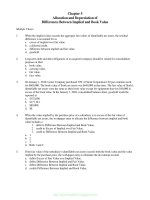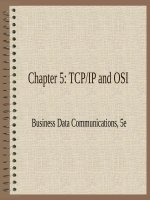business english 2e by mary chapter 05
Bạn đang xem bản rút gọn của tài liệu. Xem và tải ngay bản đầy đủ của tài liệu tại đây (921.18 KB, 62 trang )
5
Verbs
MARY ELLEN GUFFEY AND CAROLYN M.
SEEFER
BUSINES
S
ENGLISH
12e
© 2017 Cengage Learning®. May not be scanned, copied or duplicated, or posted to a
publicly accessible website, in whole or in part, except for use as permitted in a license
distributed with a certain product or service or otherwise on a password-protected
website or school-approved learning management system for classroom use.
© Larysa Ray/Shutterstock. © Valeri Potapova/Shutterstock.
LEARNING
OUTCOMES
Level 1
▶ Identify transitive,
intransitive, linking, and
helping verbs.
▶ Recognize the functions and
uses of active- and passivevoice verbs.
▶ Use correctly verbs in the
present, past, and future
tenses.
© 2017 Cengage Learning®. May not be scanned, copied or duplicated, or posted to a publicly accessible website, in whole or in part, except for use as permitted in a license distributed with a
certain product or service or otherwise on a password-protected website or school-approved learning management system for classroom use. © Larysa Ray/Shutterstock
2
Three Types of Verbs
Action
Linking
Action Verbs:
Tell what a subject
does, including
physical and mental
actions.
Helping
Mark Zuckerberg
created the
Facebook site.
(Physical action)
He wants people of
all ages to use this
social networking site.
(Mental action)
©
© 2017
2017 Cengage
Cengage Learning®.
Learning®. May
May not
not be
be scanned,
scanned, copied
copied or
or duplicated,
duplicated, or
or posted
posted to
to a
a publicly
publicly accessible
accessible website,
website, in
in whole
whole or
or in
in part,
part, except
except for
for use
use as
as permitted
permitted in
in a
a license distributed with a
license distributed
with a certain
product
or otherwise on
a password-protected
website
or school-approved
learning
management
for classroom
use. ©
certain
product or service
or otherwise
onora service
password-protected
website
or school-approved
learning
management system
for classroom
use.system
© Larysa
Ray/Shutterstock
Larysa Ray/Shutterstock
3
Action Verbs: Two Kinds
Action
Action Verbs:
Can be transitive or
intransitive
Transitive Verb:
Expresses an action
toward a person or thing;
requires a direct object
(noun or pronoun) to
complete its meaning
The committee
developed
guidelines for its
task.
(The transitive verb
developed directs
action toward its
object guidelines.)
©
© 2017
2017 Cengage
Cengage Learning®.
Learning®. May
May not
not be
be scanned,
scanned, copied
copied or
or duplicated,
duplicated, or
or posted
posted to
to a
a publicly
publicly accessible
accessible website,
website, in
in whole
whole or
or in
in part,
part, except
except for
for use
use as
as permitted
permitted in
in a
a license distributed with a
license distributed
with a certain
product
or otherwise on
a password-protected
website
or school-approved
learning
management
for classroom
use. ©
certain
product or service
or otherwise
onora service
password-protected
website
or school-approved
learning
management system
for classroom
use.system
© Larysa
Ray/Shutterstock
Larysa Ray/Shutterstock
4
Action Verbs: Two Kinds
Action
Action Verbs:
Can be transitive or
intransitive
Intransitive Verb:
Expresses action but
does not require an
object to complete its
meaning
Kim Collins works
for a large
marketing firm.
(The noun firm is
the object of the
preposition for, not
an object of the
verb works.)
©
© 2017
2017 Cengage
Cengage Learning®.
Learning®. May
May not
not be
be scanned,
scanned, copied
copied or
or duplicated,
duplicated, or
or posted
posted to
to a
a publicly
publicly accessible
accessible website,
website, in
in whole
whole or
or in
in part,
part, except
except for
for use
use as
as permitted
permitted in
in a
a license distributed with a
license distributed
with a certain
product
or otherwise on
a password-protected
website
or school-approved
learning
management
for classroom
use. ©
certain
product or service
or otherwise
onora service
password-protected
website
or school-approved
learning
management system
for classroom
use.system
© Larysa
Ray/Shutterstock
Larysa Ray/Shutterstock
5
TRY YOUR
SKILL
What are the
transitive
verbs and
their objects
in these
sentences?
1. McDonald’s gave
coupons to the winners.
2. The winners ate free
Big Macs.
3. Please run the program
a second time.
4. Place your trash in the
bin.
© 2017 Cengage Learning®. May not be scanned, copied or duplicated, or posted to a publicly accessible website, in whole or in part, except for use as permitted in a
© 2017 Cengage Learning®. May not be scanned, copied or duplicated, or posted to a publicly accessible website, in whole or in part, except for use as permitted in a license distributed with a
license distributed with a certain product or service or otherwise on a password-protected website or school-approved learning management system for classroom use. ©
certain product or service or otherwise on a password-protected website or school-approved learning management system for classroom use. © Larysa Ray/Shutterstock
Larysa Ray/Shutterstock
6
TRY YOUR
SKILL
What are the
5. Greg listened carefully
intransitive
to the proposal.
verbs in these
6. I worked at that job for
sentences?
nine years.
7. Before the test Jackie
studied very hard.
8. She sang out of tune.
© 2017 Cengage Learning®. May not be scanned, copied or duplicated, or posted to a publicly accessible website, in whole or in part, except for use as permitted in a
© 2017 Cengage Learning®. May not be scanned, copied or duplicated, or posted to a publicly accessible website, in whole or in part, except for use as permitted in a license distributed with a
license distributed with a certain product or service or otherwise on a password-protected website or school-approved learning management system for classroom use. ©
certain product or service or otherwise on a password-protected website or school-approved learning management system for classroom use. © Larysa Ray/Shutterstock
Larysa Ray/Shutterstock
7
Three Types of Verbs
Action
Linking
Linking Verbs:
“Link” or join the subject
to its complement
Complement:
A noun, pronoun, or
adjective that
renames
or describes the subject
Helping
Betty Ray is the new
vice president.
(The linking verb is
joins the
complement vice
president to the
subject.)
©
© 2017
2017 Cengage
Cengage Learning®.
Learning®. May
May not
not be
be scanned,
scanned, copied
copied or
or duplicated,
duplicated, or
or posted
posted to
to a
a publicly
publicly accessible
accessible website,
website, in
in whole
whole or
or in
in part,
part, except
except for
for use
use as
as permitted
permitted in
in a
a license distributed with a
license distributed
with a certain
product
or otherwise on
a password-protected
website
or school-approved
learning
management
for classroom
use. ©
certain
product or service
or otherwise
onora service
password-protected
website
or school-approved
learning
management system
for classroom
use.system
© Larysa
Ray/Shutterstock
Larysa Ray/Shutterstock
8
Three Types of Verbs
Linking
Some linking verbs are
derived from the verb to
be: am, is, are, was,
were, be, being, been.
Others are words that
describe sense
experiences: feel,
appear, taste, seem,
sound, smell, etc.
The engine sounds
good.
(The linking verb
sounds joins the
complement good,
which is an
adjective that
describes the
subject engine.)
©
© 2017
2017 Cengage
Cengage Learning®.
Learning®. May
May not
not be
be scanned,
scanned, copied
copied or
or duplicated,
duplicated, or
or posted
posted to
to a
a publicly
publicly accessible
accessible website,
website, in
in whole
whole or
or in
in part,
part, except
except for
for use
use as
as permitted
permitted in
in a
a license distributed with a
license distributed
with a certain
product
or otherwise on
a password-protected
website
or school-approved
learning
management
for classroom
use. ©
certain
product or service
or otherwise
onora service
password-protected
website
or school-approved
learning
management system
for classroom
use.system
© Larysa
Ray/Shutterstock
Larysa Ray/Shutterstock
9
TRY YOUR
SKILL
What are the
linking verbs
and
complements
in these
sentences?
1. The caller could have
been Jeremy.
2. It was he who called
yesterday.
3. Sheila felt bad about
the news.
4. Max looks sharp in his
new suit.
© 2017 Cengage Learning®. May not be scanned, copied or duplicated, or posted to a publicly accessible website, in whole or in part, except for use as permitted in a
© 2017 Cengage Learning®. May not be scanned, copied or duplicated, or posted to a publicly accessible website, in whole or in part, except for use as permitted in a license distributed with a
license distributed with a certain product or service or otherwise on a password-protected website or school-approved learning management system for classroom use. ©
certain product or service or otherwise on a password-protected website or school-approved learning management system for classroom use. © Larysa Ray/Shutterstock
Larysa Ray/Shutterstock
10
Three Types of Verbs
Action
Linking
Helping Verbs:
Added to main verbs to
create verb phrases
Common Helping
Verbs:
Forms of to be
Forms of to have
Forms of to do
Can, must, ought,
might, could, will, etc.
Helping
Kim Collins is
applying for a new
job.
(The helping verb is
plus the main verb
applying create a
verb phrase.)
©
© 2017
2017 Cengage
Cengage Learning®.
Learning®. May
May not
not be
be scanned,
scanned, copied
copied or
or duplicated,
duplicated, or
or posted
posted to
to a
a publicly
publicly accessible
accessible website,
website, in
in whole
whole or
or in
in part,
part, except
except for
for use
use as
as permitted
permitted in
in a
a license distributed with a
license distributed
with a certain
product
or otherwise on
a password-protected
website
or school-approved
learning
management
for classroom
use. ©
certain
product or service
or otherwise
onora service
password-protected
website
or school-approved
learning
management system
for classroom
use.system
© Larysa
Ray/Shutterstock
Larysa Ray/Shutterstock
11
TRY YOUR
SKILL
What are the
1. The applicant could
helping verbs
have arrived earlier.
and main
2. It can be difficult to
verbs in these
accept change.
sentences?
3. Susan has run a mile in
less than seven
minutes.
4. Ben must learn his new
job duties.
© 2017 Cengage Learning®. May not be scanned, copied or duplicated, or posted to a publicly accessible website, in whole or in part, except for use as permitted in a
© 2017 Cengage Learning®. May not be scanned, copied or duplicated, or posted to a publicly accessible website, in whole or in part, except for use as permitted in a license distributed with a
license distributed with a certain product or service or otherwise on a password-protected website or school-approved learning management system for classroom use. ©
certain product or service or otherwise on a password-protected website or school-approved learning management system for classroom use. © Larysa Ray/Shutterstock
Larysa Ray/Shutterstock
12
Verb Voices: Two
Categories of Transitive
Verbs
Active Voice
Passive Voice
Active Voice:
When the verb expresses an action directed
by the subject toward the object of the verb
Writing that uses active-voice verbs is clear,
direct, and forceful.
Active voice is called the voice of
business
©
© 2017
2017 Cengage
Cengage Learning®.
Learning®. May
May not
not be
be scanned,
scanned, copied
copied or
or duplicated,
duplicated, or
or posted
posted to
to a
a publicly
publicly accessible
accessible website,
website, in
in whole
whole or
or in
in part,
part, except
except for
for use
use as
as permitted
permitted in
in a
a license distributed with a
license distributed
with a certain
product
or otherwise on
a password-protected
website
or school-approved
learning
management
for classroom
use. ©
certain
product or service
or otherwise
onora service
password-protected
website
or school-approved
learning
management system
for classroom
use.system
© Larysa
Ray/Shutterstock
Larysa Ray/Shutterstock
13
Verb Voices: Two
Categories of Transitive
Verbs
Active Voice
Passive Voice
Passive Voice:
When the action of a transitive verb is directed
toward the subject
Passive-voice verbs may be used to disguise
the “doer” or agent of an action. They may also
be used when indirectness is desired.
Passive voice is called the voice of tact.
©
© 2017
2017 Cengage
Cengage Learning®.
Learning®. May
May not
not be
be scanned,
scanned, copied
copied or
or duplicated,
duplicated, or
or posted
posted to
to a
a publicly
publicly accessible
accessible website,
website, in
in whole
whole or
or in
in part,
part, except
except for
for use
use as
as permitted
permitted in
in a
a license distributed with a
license distributed
with a certain
product
or otherwise on
a password-protected
website
or school-approved
learning
management
for classroom
use. ©
certain
product or service
or otherwise
onora service
password-protected
website
or school-approved
learning
management system
for classroom
use.system
© Larysa
Ray/Shutterstock
Larysa Ray/Shutterstock
14
Active Voice v. Passive
Voice
Active Voice
We answer e-mail
messages within 24
hours.
DataPro expanded
its
operations in the
Southwest.
Mr. Lee
miscalculated
current operating
expenses.
Passive Voice
E-mail messages are
answered within 24
hours.
Operations in the
Southwest were
expanded.
Current operating
expenses were
miscalculated.
©
© 2017
2017 Cengage
Cengage Learning®.
Learning®. May
May not
not be
be scanned,
scanned, copied
copied or
or duplicated,
duplicated, or
or posted
posted to
to a
a publicly
publicly accessible
accessible website,
website, in
in whole
whole or
or in
in part,
part, except
except for
for use
use as
as permitted
permitted in
in a
a license distributed with a
license distributed
with a certain
product
or otherwise on
a password-protected
website
or school-approved
learning
management
for classroom
use. ©
certain
product or service
or otherwise
onora service
password-protected
website
or school-approved
learning
management system
for classroom
use.system
© Larysa
Ray/Shutterstock
Larysa Ray/Shutterstock
15
TRY YOUR
SKILL
What are the
1. The bank stopped
active-voice
payment on the check
verbs and
last week.
passive-voice
verbs in these 2. Taylor discovered the
losses.
sentences?
3. The losses were
discovered last week.
4. Statements were issued
for all past-due
© 2017 Cengage Learning®. May not be scanned, copied or duplicated, or posted to a publicly accessible website, in whole or in part, except for use as permitted in a
© 2017 Cengage Learning®. May not be scanned, copied or duplicated, or posted to a publicly accessible website, in whole or in part, except for use as permitted in a license distributed with a
license distributed with a certain product or service or otherwise on a password-protected website or school-approved learning management system for classroom use. ©
certain product or service or otherwise on a password-protected website or school-approved learning management system for classroom use. © Larysa Ray/Shutterstock
Larysa Ray/Shutterstock
16
Primary Tenses of Verbs
PresentTense Verbs
Past-Tense
Verbs
Express
current or
habitual
actions
Show
completed
actions
FutureTense
Verbs
Show
actions that
are
expected to
occur at a
later time
©
© 2017
2017 Cengage
Cengage Learning®.
Learning®. May
May not
not be
be scanned,
scanned, copied
copied or
or duplicated,
duplicated, or
or posted
posted to
to a
a publicly
publicly accessible
accessible website,
website, in
in whole
whole or
or in
in part,
part, except
except for
for use
use as
as permitted
permitted in
in a
a license distributed with a
license distributed
with a certain
product
or otherwise on
a password-protected
website
or school-approved
learning
management
for classroom
use. ©
certain
product or service
or otherwise
onora service
password-protected
website
or school-approved
learning
management system
for classroom
use.system
© Larysa
Ray/Shutterstock
Larysa Ray/Shutterstock
17
Primary Tenses of Verbs
PresentTense Verbs
Past-Tense
Verbs
The tense you
see in the
dictionary
Generally
formed by
adding d or
ed to the
present tense
of regular
verbs
FutureTense
Verbs
Formed by
adding will or
shall to the
present tense
of the verb
©
© 2017
2017 Cengage
Cengage Learning®.
Learning®. May
May not
not be
be scanned,
scanned, copied
copied or
or duplicated,
duplicated, or
or posted
posted to
to a
a publicly
publicly accessible
accessible website,
website, in
in whole
whole or
or in
in part,
part, except
except for
for use
use as
as permitted
permitted in
in a
a license distributed with a
license distributed
with a certain
product
or otherwise on
a password-protected
website
or school-approved
learning
management
for classroom
use. ©
certain
product or service
or otherwise
onora service
password-protected
website
or school-approved
learning
management system
for classroom
use.system
© Larysa
Ray/Shutterstock
Larysa Ray/Shutterstock
18
Primary Tenses of Verbs
Examples
PresentTense Verbs
Past-Tense
Verbs
Halle works
in the
Marketing
Department.
She
worked
late
yesterday.
FutureTense
Verbs
She will
work on
that project
next week.
©
© 2017
2017 Cengage
Cengage Learning®.
Learning®. May
May not
not be
be scanned,
scanned, copied
copied or
or duplicated,
duplicated, or
or posted
posted to
to a
a publicly
publicly accessible
accessible website,
website, in
in whole
whole or
or in
in part,
part, except
except for
for use
use as
as permitted
permitted in
in a
a license distributed with a
license distributed
with a certain
product
or otherwise on
a password-protected
website
or school-approved
learning
management
for classroom
use. ©
certain
product or service
or otherwise
onora service
password-protected
website
or school-approved
learning
management system
for classroom
use.system
© Larysa
Ray/Shutterstock
Larysa Ray/Shutterstock
19
Challenges Using Primary
Tenses
Third-person singular verbs require an
-s ending. This -s ending is not added to
other singular verbs.
First-person singular:
I enjoy tackling challenging projects.
Second-person singular:
You enjoy taking long walks after dinner.
Third-person singular:
He enjoys playing baseball with his son.
Brianna enjoys skiing in the winter.
Our dog enjoys eating our leftovers.
©
© 2017
2017 Cengage
Cengage Learning®.
Learning®. May
May not
not be
be scanned,
scanned, copied
copied or
or duplicated,
duplicated, or
or posted
posted to
to a
a publicly
publicly accessible
accessible website,
website, in
in whole
whole or
or in
in part,
part, except
except for
for use
use as
as permitted
permitted in
in a
a license distributed with a
license distributed
with a certain
product
or otherwise on
a password-protected
website
or school-approved
learning
management
for classroom
use. ©
certain
product or service
or otherwise
onora service
password-protected
website
or school-approved
learning
management system
for classroom
use.system
© Larysa
Ray/Shutterstock
Larysa Ray/Shutterstock
20
Challenges Using Primary
Tenses
Timeless Facts: use present-tense verbs,
even if the verbs occur with other pasttense verbs.
What is (not was) the name of the person who
called me yesterday?
Verbs changing form: watch for verbs
ending in y and some with the final
consonant doubled.
Sonia hurried (not hurryed) to catch the train.
What important events occurred (not
occured) last year?
©
© 2017
2017 Cengage
Cengage Learning®.
Learning®. May
May not
not be
be scanned,
scanned, copied
copied or
or duplicated,
duplicated, or
or posted
posted to
to a
a publicly
publicly accessible
accessible website,
website, in
in whole
whole or
or in
in part,
part, except
except for
for use
use as
as permitted
permitted in
in a
a license distributed with a
license distributed
with a certain
product
or otherwise on
a password-protected
website
or school-approved
learning
management
for classroom
use. ©
certain
product or service
or otherwise
onora service
password-protected
website
or school-approved
learning
management system
for classroom
use.system
© Larysa
Ray/Shutterstock
Larysa Ray/Shutterstock
21
TRY YOUR
SKILL
1. You (plan, plans) to apply
Select the
for the position, don’t you?
correct verb to
2. He (plan, plans) to apply
complete
for the position too.
these
3. What (is, was) your maiden
sentences.
name?
4. We (tryed, tried) our best
to accommodate everyone.
5. She (refered, referred) to
her earlier message.
© 2017 Cengage Learning®. May not be scanned, copied or duplicated, or posted to a publicly accessible website, in whole or in part, except for use as permitted in a
© 2017 Cengage Learning®. May not be scanned, copied or duplicated, or posted to a publicly accessible website, in whole or in part, except for use as permitted in a license distributed with a
license distributed with a certain product or service or otherwise on a password-protected website or school-approved learning management system for classroom use. ©
certain product or service or otherwise on a password-protected website or school-approved learning management system for classroom use. © Larysa Ray/Shutterstock
Larysa Ray/Shutterstock
22
LEARNING
OUTCOMES
Level 2
▶ Recognize and use correctly
participles, gerunds, and
infinitives.
▶ Identify and remedy dangling
verbal phrases and other
misplaced modifiers.
▶ Understand and apply the
subjunctive mood correctly.
© 2017 Cengage Learning®. May not be scanned, copied or duplicated, or posted to a publicly accessible website, in whole or in part, except for use as permitted in a license distributed with a
certain product or service or otherwise on a password-protected website or school-approved learning management system for classroom use. © Larysa Ray/Shutterstock
23
Present and Past
Participles
To be able to use verbs correctly,
you must recognize present
participles and past participles.
Both participles form verb
Helper(s) + Main Verb = Verb
phrases.
Phrase
©
© 2017
2017 Cengage
Cengage Learning®.
Learning®. May
May not
not be
be scanned,
scanned, copied
copied or
or duplicated,
duplicated, or
or posted
posted to
to a
a publicly
publicly accessible
accessible website,
website, in
in whole
whole or
or in
in part,
part, except
except for
for use
use as
as permitted
permitted in
in a
a license distributed with a
license distributed
with a certain
product
or otherwise on
a password-protected
website
or school-approved
learning
management
for classroom
use. ©
certain
product or service
or otherwise
onora service
password-protected
website
or school-approved
learning
management system
for classroom
use.system
© Larysa
Ray/Shutterstock
Larysa Ray/Shutterstock
24
Present Participle
Present participle: formed by
adding ing to the present part of the
verb
When used in a sentence, the present
participle is generally preceded by
some form of the helping verb to be
Theis,
contract
is lying
on the
(am,
are, was,
were,
be,desk.
been).
We are analyzing both proposals.
©
© 2017
2017 Cengage
Cengage Learning®.
Learning®. May
May not
not be
be scanned,
scanned, copied
copied or
or duplicated,
duplicated, or
or posted
posted to
to a
a publicly
publicly accessible
accessible website,
website, in
in whole
whole or
or in
in part,
part, except
except for
for use
use as
as permitted
permitted in
in a
a license distributed with a
license distributed
with a certain
product
or otherwise on
a password-protected
website
or school-approved
learning
management
for classroom
use. ©
certain
product or service
or otherwise
onora service
password-protected
website
or school-approved
learning
management system
for classroom
use.system
© Larysa
Ray/Shutterstock
Larysa Ray/Shutterstock
25









